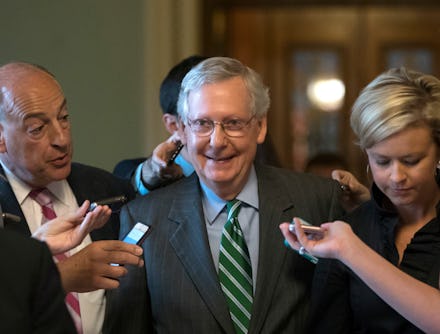Senate Health Care Bill: How senators plan to vote on the GOP health care plan

The health care overhaul Republicans crafted behind closed doors is finally out, with a vote tentatively scheduled for Thursday.
But the bill is already facing an uphill battle, as a handful of Republican senators have announced they don't support the bill in its current form, with one GOP senator saying he won't support the legislation at all.
As it stands, Republicans currently do not have the 50 votes they will need to pass the bill. Yet that doesn't mean they won't get to that number before the vote.
Here's how senators plan to vote on the GOP's health care bill.
The hell-noes (49)
Every Senate Democrat: Not one Democratic senator plans to vote for the Republican health care plan, which Democrats are panning as "mean" — using President Donald Trump's own characterization of the House bill.
That even includes moderate Democratic senators up for re-election in 2018 in challenging terrain, such as Sen. Joe Manchin (D-W.Va.) who will face voters in a state Trump carried by double digits.
Sen. Dean Heller (R-Nev.): Heller is the only GOP senator so far to say they won't vote for the plan. He announced his opposition to the bill in a Friday news conference, in which he simultaneously validated much of the Democratic argument against the bill while announcing he couldn't support it.
"I cannot support a piece of legislation that takes away insurance from tens of millions of Americans and hundreds of thousands of Nevadans," Heller said.
Heller is the one Republican senator up for re-election in 2018 in a state Hillary Clinton carried in the 2016 election, making him vulnerable to a Democratic challenger.
The likely noes (4)
Four Senate conservatives came out on Thursday to say they won't vote for the bill in its current form, but appeared open to voting for it if changes were made.
Sens. Rand Paul (R-Ky.), Ted Cruz (R-Texas), Mike Lee (R-Utah) and Ron Johnson (R-Wis.) issued a joint statement saying they oppose the bill in its current form.
"Currently, for a variety of reasons, we are not ready to vote for this bill, but we are open to negotiation and obtaining more information before it is brought to the floor," the senators wrote in a statement.
Johnson has expanded on his concerns with the legislation, writing in a New York Times op-ed on Monday that the bill "relies too heavily on government spending, and ignores the role that the private sector can and should play."
Johnson has also said he thinks the bill warrants more time before it's put to a vote.
Ultimately, however, these conservative senators may well vote for the bill. All have said they can get to "yes."
The wary but undecided (3)
A number of moderate Senate Republicans have come out to express concerns with the current bill, but none of those senators have expressly said they won't vote for the bill.
Sen. Susan Collins (R-Maine) said she has "serious concerns" about the bill. Sen. Lisa Murkowski (R-Alaska) is concerned not only about potential Medicaid cuts, but she also does not support how the legislation cuts funding to Planned Parenthood. Sen. Rob Portman (R-Ohio) said he was concerned about how the proposed Medicaid cuts would impact the worsening opioid crisis.
Of course, that all could change once the nonpartisan Congressional Budget Office releases its analysis on the bill's impacts. The CBO report could come as early as Monday, and is likely to show between 15 to 22 million more people will be uninsured over the next 10 years, according to Politico.
That report could move these wary senators to the "no" column.
Collins said the CBO score will determine how she votes.
If Collins and Murkowski flip to the "no" side along with Heller, the Senate GOP plan in its current form is dead.